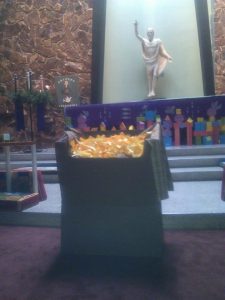After 26 years, what more is there to say? You know all my catchphrases and my pet peeves. If you’re still reading at this point, you’re used to my agenda.
Let’s go back to the beginning–why did I get into this way of life?
For these last words, let’s go back to the beginning—well, the beginning of my vocation. I was inspired to become a priest by the bishop of my youth. He preached about how all people had something to offer to the Kingdom of God. This message shouldn’t be revolutionary—it is articulated in St. Paul’s First Letter to the Corinthians, and that’s one of the oldest Christian writings we have! However, the Church has a habit of getting off track and needing correction. This correction comes from the 1970’s.
Back then the Christian life, and especially the work of sharing the Christian vision, was the job of the professional Christians—clergy, missionaries, and the like. Regular believers went to church, moved through the sacramental rites of passage, and then pursued their own lives. Just look at the vestry minutes of the day: half-page records of vestrymen (all men, because women didn’t get a say in the church until the late 60’s) reviewed the budget and heard the Rector’s report describing all the work he had done over the month. The vestry could criticize the priorities or time management of that Rector, but they did not share in his work.
I was inspired by the idea that everyone could contribute. I imagined all the church members working together, each with their particular abilities, just like St. Paul described, to create a community of inspired purpose. My job would be to lead this partnership.
31 years later, I have learned a bit more. I did not recognize back in the ‘70’s, and even when I was in seminary, the reality of power. We imagine that we are all equal, true in a cosmic, God’s eyes, perspective. However. we live in an unequal world, and we all have our own experiences of strength, dismissal, and our place in the power structure. It’s easy to believe you can do anything when you’ve never been told otherwise or encountered the obstacles of race, gender or poor parenting, but that’s not most people’s experience. The Gospel frees us from those restrictions, but it takes courage and daring to live out of that freedom. We have to grow in faith. It’s also easy as a leader to get caught up in finishing the work that has to be done, giving up on the community vision completely. Enacting this vision isn’t as easy as it sounds.
In the preaching moment, together, we create our understanding and response to the Gospel.
Where I have found this shared reality of Christian community to be real in recent years is in preaching. The sermon is the obvious opportunity for the preacher to communicate the truth as the preacher sees it. This can be a take-it-or-leave-it proposition: Many people leave the church offended by what a preacher has to say, and more than one preacher has been happy to see them go! Preacher and preachee imagine the congregation to be passive recipients. Worship should be about offering not watching. As I have been preaching for response, using my famous props and sermon questions, I have been trying to change the dynamic. You are not passive recipients of my great truth; together we create our understanding and response to the Gospel. Understanding that, I want to leave you with my last words, taken from your words written on Advent hay. Here are some things to remember:
Peace and quiet: We have to take time for the spiritual life—all of us, clergy professionals and church members. Relationships take time, and the one at the heart of our faith is no exception. Wisdom from the Advent hay calls us all to take time.
Hope: What Christians have, that nonbelievers need, is a vision of how things could be. We can be brave enough to look at reality, knowing that the truth sets us free; no need to claim a perfection we don’t have or to despair over the way things are. This year words on our Advent hay aimed to make hope real. We promised to take acts large and small, from listening without judgment to serving our community in various ways. These actions arise from a vision of who we are meant to be, not from an awareness of limitations, competition, or divisions. Our world focuses on these things, giving the impression that there are no alternatives. We respond automatically. In faith we see things differently, and that difference changes the world. That’s what God’s people do.
Wilderness: God meets and guides his people in the wilderness. The way isn’t obvious, so we are open to options. Listening to God requires quiet (see above) and bravery to try something new. We find new life in joining this adventure instead of looking back to the way it was when everything worked. We have to be brave enough to enter the wilderness.
I am finding it very hard to leave Trinity. You may feel abandoned. I feel defeated. But the truth is so much bigger than our feelings. We serve a vision far beyond what is comfortable and familiar. Now it is time for us all to go past the comfortable and into an inspired future. I know that you have the wisdom to move forward into that future, gaining new leadership to guide you on the next step. If my ministry has done anything, it has given you the ability to serve and build this community without depending on me. Let us bless each other as we are apart, each with different callings and gifts, all serving the same truth..

